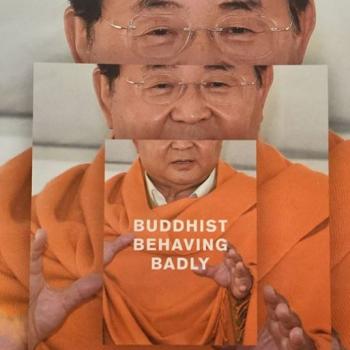This is Ajahn Brahmali, talking at the Buddhist Society of Western Australia about much of the same territory that I covered in two recent posts:
It has been a theme in my work in the past and is developing into a somewhat major theme in my academic work currently – that we need to get clear about the kind of pleasure we are after – I prefer the word ‘happiness’, but no single term is going to be perfect here, because we are talking about two fundamentally different things:
- sensual vs spiritual pleasure,
- happiness vs virtue,
- frivolity vs joy
- good vs bad happiness
- kama vs sukkha
- pleasure vs flourishing – etc…
Aristotle famously argued that all human goods are only desirable for the sake of eudaimonia, which can mean simply good (eu) souled (daimonia), but which Aristotle considered to be “a mere substitute for eu zên (“living well”)” (source). In Aristotle is borne the idea that what is distinct about Humanity is our capacity for reason, one that continues in Western traditions to this day. Of course part of Aristotle’s conception is that our ultimate happiness is dependent on certain outside goods, such as good looks and strength, as “Someone who is friendless, childless, powerless, weak, and ugly will simply not be able to find many opportunities for virtuous activity over a long period of time, and what little he can accomplish will not be of great merit” (ibid.).
As close as this comes to Buddhism in certain respects (friendship, for instance), most other points show a clear straying away from the inner self-sufficiency taught by the Buddha. Sure, good looks and stregth don’t hurt, and they may even be attributed to one’s good deeds/karma in a past life; but they are not necessary at all for the final goal of Buddhism. As Richard Kraut’s summary of Aristotelian ethics points out, for Aristotle, “To some extent, then, living well requires good fortune; happenstance can rob even the most excellent human beings of happiness.”
As the stories of Angulimala and Kisa Gotama make clear, it is sometimes the most wretched who rather quickly turn things around to attain the highest good. Perhaps we could say that simply meeting the Buddha was their great fortune – overwhelming the bad fortune that had beset them earlier on in life…. But I’ll wait for another time to further delve into Aristotelian/post-Aristotelian comparisons with early Buddhism. For now, enjoy Ajahn Brahmali’s talk, which points out (I hope) many of the finer distinctions between the two kinds of happiness and the need for experiential and progressive understanding of each that I haven’t covered yet.
Let me know if you think he misses any key points or is mistaken about any as well.
* Ajahn Brahmali was born in Norway in 1964. He first became interested in Buddhism and meditation in his early 20s after a visit to Japan. Having completed degrees in engineering and finance, he began his monastic training as an anagarika (keeping the eight precepts) in England at Amaravati and Chithurst Buddhist Monasteries.
After hearing the ‘word of Brahm’ he decided to travel to Australia to train at Bodhinyana Monastery. Ajahn Brahmali has lived at Bodhinyana Monastery since 1994, and was ordained as a Bhikkhu, withAjahn Brahm as his preceptor, in 1996. – via here: read more…
P.S. I should note my thanks to Tom Armstrong and Mufi in the last two posts (see comments here and here) and welcome further constructive discussion.











